On Deck With Bora Dimitrov, St. Francis Brooklyn Head Water Polo Coach
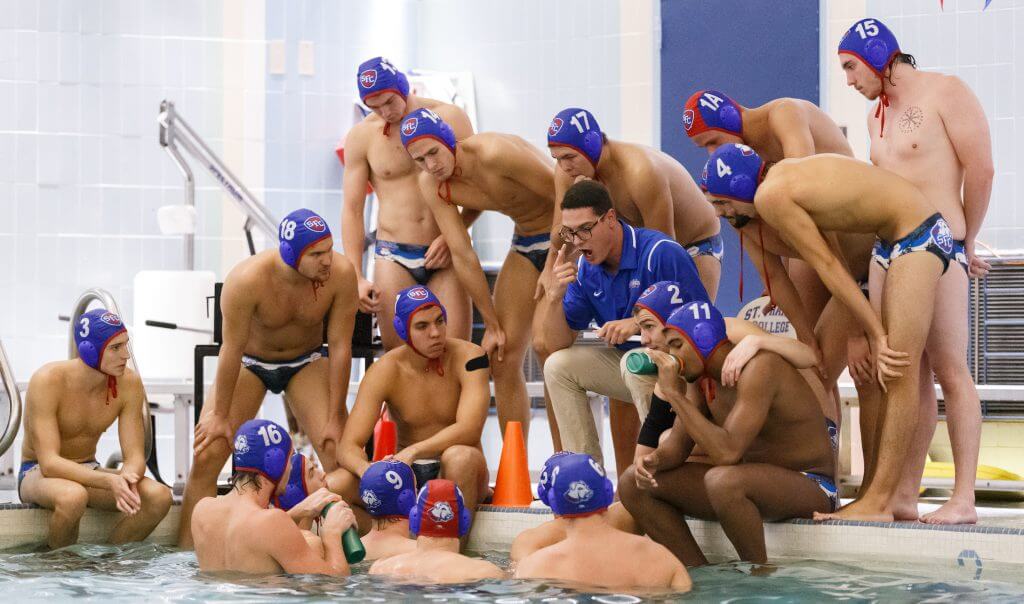
BROOKLYN HEIGHTS, NY. It’s been a banner season so far for the St. Francis Brooklyn men’s water polo team. With an 11-4 record—3-1 in Northeast Water Polo Conference (NWPC) play—so far in 2019, the Terriers have demonstrated they are a prime contender to advance to their first NCAA tournament since 2013.
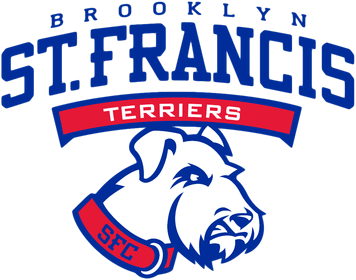
SFC swims 22 deep, the most roster depth in almost a decade, with a mixture of experienced players and talented newcomers. Anchored by the outside sniping ability of Ivan Stefanovic (34 goals, 13 goals), Dominick Hevesi (32 goals) and Will Lapkin (23 goals, 11 assists), the Terriers also boast three quality centers—Zane Drobenko, Vladimir Mickic and William Simpson—who provide interior offense. Senior netminders Benedek Molnar and Viktor Klauzer are a dynamic duo whose play will be essential if St. Francis is to supplant NWPC rivals Brown, Harvard and Princeton.
A weekend of competitive action at their home pool demonstrated that the Terriers are legitimate contenders for top conference honors, but it also confirmed that the road to supremacy in the East will go through Harvard. After wins against Brown and MIT, the Terriers came up against an undefeated and undaunted Crimson squad that took an early lead on their way to a fifth-straight win over the Brooklynites.
[Northeast Water Polo Conference Report: Harvard Reigns Supreme in Opening Weekend of Conference Play]
Breaking down that match and the season was SFC Head Coach Bora Dimitrov. Now in his fourth season in Brooklyn Heights, Dimitrov spoke to Swimming World about the challenges of building a winning program while getting the most out of an international roster of players as they contend with NWPC opponents, adverse pool conditions and referees whose calls they may not agree with.
– Talk about this weekend where you have a couple of great wins—and then Harvard comes in and spoils the party.
When you take everything into consideration, both games [Saturday] we came out strong. This game against Harvard, it seemed that we didn’t come out strong as we were supposed to. They’re definitely very physical, great swimmers, and it’s really hard to match that level of intensity. We failed in that today.
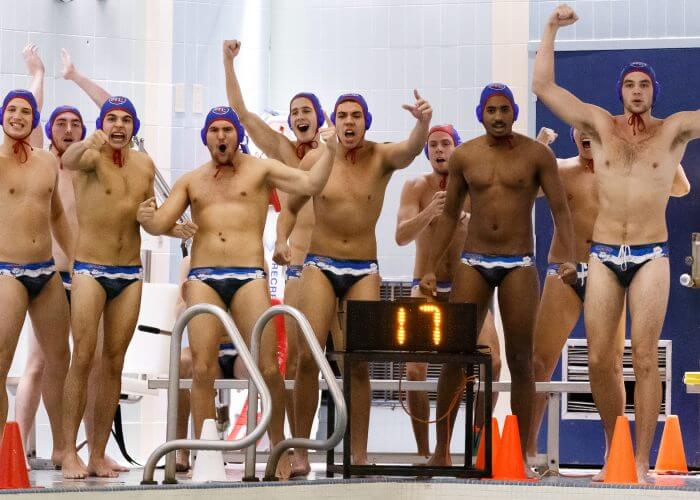
In their home pool, Terrier celebrations are a regular event. Photo Courtesy: Joseph Gomez
There are games to come, and we have a lot of new guys—some of them might be our key players—who are not managing themselves very well in the small pool. Hopefully, when we go back to the big pool it’s going to be a little different.
– Whenever you play Harvard, it seems that managing emotions is key. For instance, your star freshman Hevesi, took a senseless penalty because of frustration with a referee’s call.
That’s always the challenge of St. Francis. So many guys are coming from different backgrounds, and they need to adjust to the new system of refereeing. This is the first weekend we had one, West Coast referee, who has a different standard.
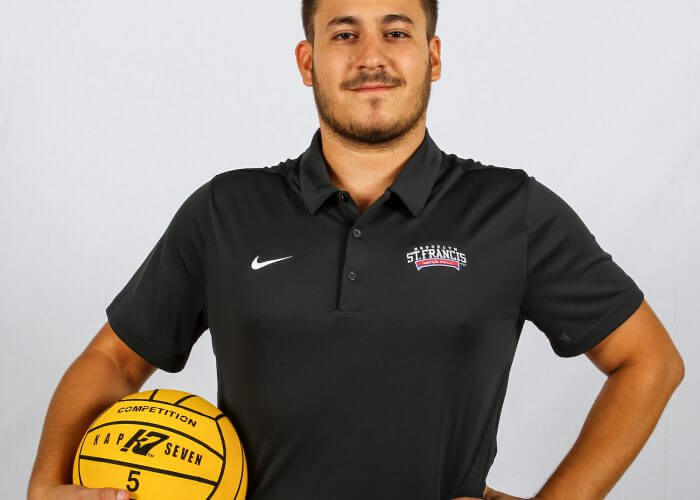
Dominick Hevesi. Photo Courtesy: Larry Levanti
For a lot of our guys it was really hard to adjust to his way of refereeing. It’s a lot of emotions that at some point as a coach you need to address to make them realize it’s a different ballgame—not like what they played in Europe or South America or wherever they come from.
It’s always the biggest challenge for our team. A lot of them bring that passion to the team, and you have to be grateful for it. But, you’ve got to manage the part where the passion goes out of control.
It depends a lot on us coaches, but at the same time the guys have to understand they’re not going to change anything with their frustrations in the pool. It’s just going to make things go in the opposite direction of where [they] need to.
That being said, there’s a couple of guys who had the same reaction as Hevesi. We’re going to work on it, we’re going to make them understand that this is it. There’s a small difference between winning and losing; how do you react on these calls? If you react in the wrong way it’s very easy that the other team will use that against you.
– You’ve got two more matches at home—against Iona and Princeton—and then it’s all deep pools. How prepared are you to shift to different playing conditions?
We have a very good center trio this year, and the fact that we couldn’t use them much this weekend was devastating because throughout our first couple of matches [this season] we really established our game around them.
This weekend they had extreme difficulties in terms of setting up and getting position without an offensive foul—there was s significant lack of their presence. That needs to be addressed. In a deeper pool they’re going to have more opportunity to get in position because in a small pool that’s really hard.
We are not able to post up people as much because sets are [usually] dominant. So that was the difference; we started the season really good at the set position and got the most out of it. Then the small pool came, with less space for them to move and play. And the result was we weren’t getting exclusions throughout the whole weekend.
We need to work on that, we need to work on our game when the sets are not able to play. We’re going to have two more games in a small pool so we definitely have to work on these things.
Regardless of that, my personal opinion is we really had issues adjusting to the refereeing this weekend—and that’s something we need to work on—managing our reactions and emotions. That’s going to be crucial going forward.
– The Terriers have more depth than they’ve had in a long time. How does this allow you to get to where you want to be in November, which is the NWPC finals?
It all depends on how we approach the game. My goal for the rest of the season is to stabilize our game. We have a lot of individual quality, but we only have two and a half months to put that into a team. And we don’t work as much as other teams in the off-season. So that puts the brakes on us.
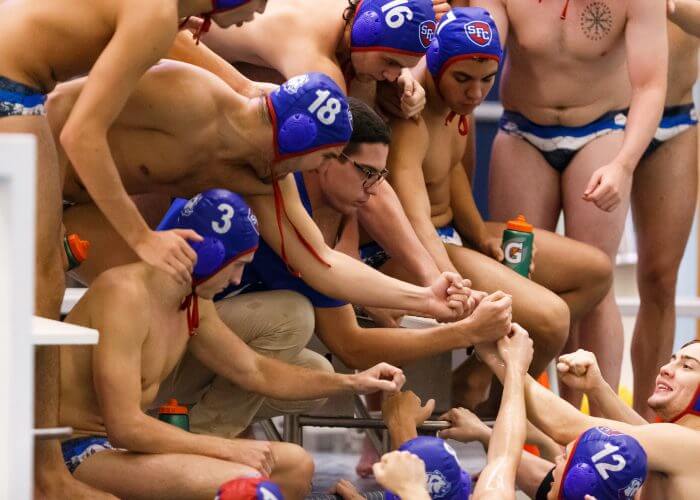
There’s no question SFC is all in to win in 2019. Photo Courtesy: Joseph Gomez
Over the summer, all the international guys go home, and then you only have three weeks preparation period [before the season starts]. I hate to mention this but in the first three weeks of our season we didn’t have a pool! We had to use different pools around the area.
It took us a significant amount of time to prepare for these games which we didn’t have. That stopped us from utilizing the best of our capabilities.
That’s been our biggest challenge so far—the lack of hours spent in the pool.
Going forward, we’re going to utilize every single opportunity we have to get in the water, to work on these things. We have four tough weekends coming up, including Princeton [next Saturday], the Harvard crossover, we’re going to go to Santa Clara and right away we have a big conference weekend in Rhode Island and Massachusetts.
That being said, we’re going to have to adjust through games, and next time we meet Harvard, as well as other teams, we need to come out more physical with better countering—and I think the big pool will open up our opportunities more.



